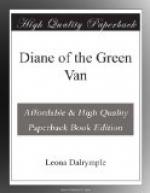Some subtle, nameless sympathy of the forest leaped like a spark from eye to eye—then with a slow, grave smile in which there was much less reserve, the Seminole motioned her guest to a seat by the fire.
Nothing loath, Diane promptly tethered her horse and squatted Indian fashion by the cartwheel fire, immensely thrilled and diverted by her picturesque adventure.
“My name,” she offered presently with her ready smile, “is Diane.”
“Di-ane,” said the Indian girl majestically. And added naively, “She was the Roman goddess of light—and of hunting, is it not so?”
Diane looked very blank.
“Where in the world—” she stammered, staring, and colored.
The Indian girl smiled.
“From so high,” she said shyly, “I have been taught by Mic-co. Like the white student of books, I know many curious things that he has taught me.”
“And your name?” asked Diane, heroically mastering her mystified confusion. “May I—may I not know that too?”
“Shock-kil-law,” came the ready reply.
“That readily becomes Keela!” exclaimed Diane smiling.
The girl nodded.
“So Mic-co has said. And so indeed he calls me.”
“Tell me, Keela, what does it mean?”
“Red-winged blackbird,” said Keela.
It was eminently fitting, thought Diane, and glanced at Keela’s hair and cheeks.
There was a wild duck roasting in the hub of coals—from the burning spokes came the smell of cedar. The Indian girl majestically broke a segment of koonti bread and proffered it to her companion. With faultless courtesy Diane accepted and presently partook with healthy relish of a supper of duck and sweet potatoes.
The silence of the Indian girl was utterly without constraint.
“I wonder,” begged Diane impetuously, “if you’ll tell me who Mic-co is? I’m greatly interested. He taught you about Rome?”
Nodding, the Indian girl said in her quaint, deliberate English that Mic-co was her white foster father. The Seminoles called him Es-ta-chat-tee-mic-co—chief of the White Race. Most of them called him simply Mic-co. He was a great and good medicine man of much wisdom who dwelt upon a fertile chain of swamp islands in the Everglades. The Indians loved him.
Still puzzled, Diane diffidently ventured a question or two, marveling afresh at the girl’s beauty and singular costume.
“I am of no race,” said Keela sombrely. “My father was a white man; my mother not all Indian; my grandfather—a Minorcan. Six moons I live with my white foster father. And I live then as I wish—like the daughter of white men. Six moons I dwell with the clan of my mother. Such is my life since the old chief made the compact with Mic-co. Come!” she added and led the way to the Indian wagon.
“When the night-winds call,” she said wistfully, “I grow restless—for I am happiest in the lodge of Mic-co. Then the old chief bids me travel to the world of white men and sell.” There was gentle pathos in her mellow voice.




